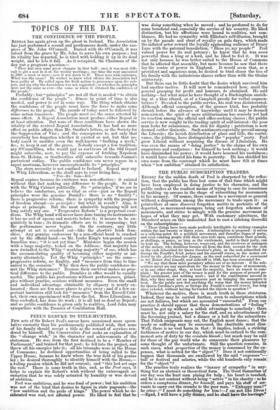PEEL'S REBUKE TO TITLE-HUNTERS.
FEW acts of Sir Robert Peel's career have occasioned more specu- lative curiosity than his posthumously published wish, that none of his family should accept a title as the reward of services ren- dered by himself. The Conservative Post seeks an explanation of the "strange wish," in the character and achievements of the statesman. He was from the first destined to be a "Member of Parliaments" and trained for that post; he fell into the project, and threw all his energies into it; all his triumphs were in the House of Commons ; he declined opportunities of being called to the Upper House, because he knew where the true field of his genius lay ; he desired thoroughly to identify himself with the House,— a ruling 'Anion which he did not conceal; and "this last act caps the rest." There is some truth in this, and, as the Post says, it helps to explain Sir Robert's wish without the extravagant as- sumption that he was solely actuated by humility or was devoid of ambition. FEW acts of Sir Robert Peel's career have occasioned more specu- lative curiosity than his posthumously published wish, that none of his family should accept a title as the reward of services ren- dered by himself. The Conservative Post seeks an explanation of the "strange wish," in the character and achievements of the statesman. He was from the first destined to be a "Member of Parliaments" and trained for that post; he fell into the project, and threw all his energies into it; all his triumphs were in the House of Commons ; he declined opportunities of being called to the Upper House, because he knew where the true field of his genius lay ; he desired thoroughly to identify himself with the House,— a ruling 'Anion which he did not conceal; and "this last act caps the rest." There is some truth in this, and, as the Post says, it helps to explain Sir Robert's wish without the extravagant as- sumption that he was solely actuated by humility or was devoid of ambition.
Peel was ambitious, and he was fond of power ; but his ambition was not of the kind that desires to figure in state pageants—the "low ambition and the pride of kings." The power which he de- aiderated was real, not affected power. He liked to feel that he was doing something when he moved ; and he preferred to do for some beneficial end, especially the service of his country. He bled distinction, but his affections were bound to realities, not sem- blances. He had no sympathy with Elliston's self-illusion, brought on by the parade and strut of royalty on gala days, which made the inflated actor reward the loyally applauding audience of Drury Lane with the paternal benediction, "Bless ye, my people !" Peel valued power for its real potency; he knew that he was more powerful than a king or a lord, and he liked to feel it It was not only because he was better suited to the House of Commons that he affected that assembly, but more because he saw that there lay the centre of power in England. It would seem that, as a provident and sagacious man, he desired to bind closer the ties of his family with the industrious classes rather than with the titular aristocracy. But there can be little doubt that the desire which survived him had another motive. It will now be remembered how, amid the general grasping for profit and honours, he abstained. He said nothing—but what must he have thought of a Buckingham snatch- ing at a blue riband, or of a Campbell greedy for verbal augmen- tatives ? Devoted to the public service, his zeal was disinterested. Although official corruption, of the grosser kind, has probably shrunk before the advance of knowledge until it may be deemed nonexistent, the spirit of mere utilitarianism has scarcely yet had its reaction among the official and office-seeking classes ; the public service is now sought in the trading spirit of self-interest : the poor man looks for subsistence, the rich for dignity : patriotism is now deemed rather Quixotic. Such sentiments especially prevail among the Liberals ; the lavish distribution of place and title, the contri- vance, the jobbing, have distinguished the " popular " party. Peel grew Liberal without acquiring the disease of Liberalism. He was even the means of "doing justice" to the claims of his own supporters and coadjutors : for himself he took nothing; it would have diminished his power; it would have lessened his usefulness; it would have obscured his fame to posterity. He has shielded his own name from the contempt which he must have felt at times when "low ambition" attained its satisfaction.


























 Previous page
Previous page